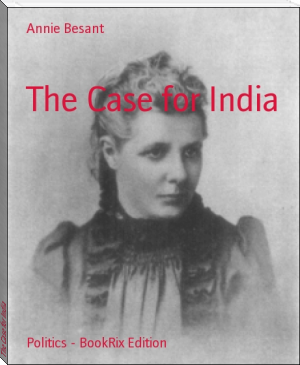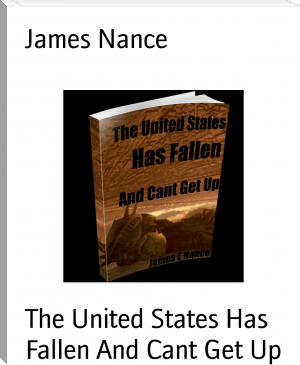The Case for India by Annie Besant (100 best novels of all time TXT) 📕

Read free book «The Case for India by Annie Besant (100 best novels of all time TXT) 📕» - read online or download for free at americanlibrarybooks.com
- Author: Annie Besant
Read book online «The Case for India by Annie Besant (100 best novels of all time TXT) 📕». Author - Annie Besant
In 1904 and 1905, the Congress declared that the then military expenditure was beyond India's power to bear, and in the latter year prayed that the additional ten millions sterling sanctioned for Lord Kitchener's reorganisation scheme might be devoted to education and the reduction of the burden on the raiyats. In 1908, the burdens imposed by the British War Office since 1859 were condemned, and in the next year it was pointed out that the military expenditure was nearly a third of the whole Indian revenue, and was starving Education and Sanitation.
Lord Kitchener's reorganisation scheme kept the Indian Army on a War footing, ready for immediate mobilisation, and on January 1, 1915, the regular army consisted of 247,000 men, of whom 75,000 were English; it was the money spent by India in maintaining this army for years in readiness for War which made it possible for her to go to the help of Great Britain at the critical early period to which I alluded. She spent over L20 millions on the military services in 1914-15. In 1915-16 she spent L21.8 millions. In 1916-17 her military budget had risen to L12 millions, and it will probably be exceeded, as was the budget of the preceding year by L1-2/3 million.
Lord Hardinge, the last Viceroy of India, who is ever held in loving memory here for his sympathetic attitude towards Indian aspirations, made a masterly exposition of India's War services in the House of Lords on the third of last July. He emphasised her pre-War services, showing that though 19-1/4 millions sterling was fixed as a maximum by the Nicholson Committee, that amount had been exceeded in 11 out of the last 13 budgets, while his own last budget had risen to 22 millions. During these 13 years the revenue had been only between 48 and 58 millions, once rising to 60 millions. Could any fact speak more eloquently of India's War services than this proportion of military expenditure compared with her revenue?
The Great War began on August 4th, and in that very month and in the early part of September, India sent an expeditionary force of three divisions--two infantry and one cavalry--and another cavalry division joined them in France in November. The first arrived, said Lord Hardinge, "in time to fill a gap that could not otherwise have been filled." He added pathetically: "There are very few survivors of those two splendid divisions of infantry." Truly, their homes are empty, but their sons shall enjoy in India the liberty for which their fathers died in France. Three more divisions were at once sent to guard the Indian frontier, while in September a mixed division was sent to East Africa, and in October and November two more divisions and a brigade of cavalry went to Egypt. A battalion of Indian infantry went to Mauritius, another to the Cameroons, and two to the Persian Gulf, while other Indian troops helped the Japanese in the capture of Tsingtau. 210,000 Indians were thus sent overseas. The whole of these troops were fully armed and equipped, and in addition, during the first few weeks of the War, India sent to England from her magazines "70 million rounds of small-arm ammunition, 60,000 rifles, and more than 550 guns of the latest pattern and type."
In addition to these, Lord Hardinge speaks of sending to England
enormous quantities of material,... tents, boots, saddlery,
clothing, etc., but every effort was made to meet the
ever-increasing demands made by the War Office, and it may be
stated without exaggeration that India was bled absolutely
white during the first few weeks of the war.
It must not be forgotten, though Lord Hardinge has not reckoned it, that all wastage has been more than filled up, and 450,000 men represent this head; the increase in units has been 300,000, and including other military items India had placed in the field up to the end of 1916 over a million of men.
In addition to this a British force of 80,000 was sent from India, fully trained and equipped at Indian cost, India receiving in exchange, many months later, 34 Territorial battalions and 29 batteries, "unfit for immediate employment on the frontier or in Mesopotamia, until they had been entirely re-armed and equipped, and their training completed."
Between the autumn of 1914 and the close of 1915, the defence of our own frontiers was a serious matter, and Lord Hardinge says:
The attitude of Afghanistan was for a long time doubtful,
although I always had confidence in the personal loyalty of our
ally the Amir; but I feared lest he might be overwhelmed by a
wave of fanaticism, or by a successful Jehad of the tribes....
It suffices to mention that, although during the previous three
years there had been no operations of any importance on the
North-West frontier, there were, between November 29, 1914, and
September 5, 1915, no less than seven serious attacks on the
North-West frontier, all of which were effectively dealt with.
The military authorities had also to meet a German conspiracy early in 1915, 7,000 men arriving from Canada and the United States, having planned to seize points of military vantage in the Panjab, and in December of the same year another German conspiracy in Bengal, necessitating military preparations on land, and also naval patrols in the Bay of Bengal.
Lord Hardinge has been much attacked by the Tory and Unionist Press in England and India, in England because of the Mesopotamia Report, in India because his love for India brought him hatred from Anglo-India. India has affirmed her confidence in him, and with India's verdict he may well rest satisfied.
I do not care to dwell on the Mesopotamia Commission and its condemnation of the bureaucratic system prevailing here. Lord Hardinge vindicated himself and India. The bureaucratic system remains undefended. I recall that bureaucratic inefficiency came out in even more startling fashion in connection with the Afghan War of 1878-79 and 1879-80. In February 1880, the war charges were reported as under L4 millions, and the accounts showed a surplus of L2 millions. On April 8th the Government of India reported: "Outgoing for War very alarming, far exceeding estimate," and on the 13th April "it was announced that the cash balances had fallen in three months from thirteen crores to less than nine, owing to 'excessive Military drain' ... On the following day (April 22) a despatch was sent out to the Viceroy, showing that there appeared a deficiency of not less than 5-1/4 crores. This vast error was evidently due to an underestimate of war liabilities, which had led to such mis-information being laid before Parliament, and to the sudden discovery of inability to 'meet the usual drawings.'"
It seemed that the Government knew only the amount audited, not the amount spent. Payments were entered as "advances," though they were not recoverable, and "the great negligence was evidently that of the heads of departmental accounts." If such a mishap should occur under Home Rule, a few years hence--which heaven forbid--I shudder to think of the comments of the _Englishman_ and the _Madras Mail_ on the shocking inefficiency of Indian officials.
In September last, our present Viceroy, H.E. Lord Chelmsford, defended India against later attacks by critics who try to minimise her sacrifices in order to lessen the gratitude felt by Great Britain towards her, lest that gratitude should give birth to justice, and justice should award freedom to India. Lord Chelmsford placed before his Council "in studiously considered outline, a summary of what India has done during the past two years." Omitting his references to what was done under Lord Hardinge, as stated above, I may quote from him:
On the outbreak of war, of the 4,598 British officers on the
Indian establishment, 530 who were at home on leave were
detained by the War Office for service in Europe. 2,600
Combatant Officers have been withdrawn from India since the
beginning of the War, excluding those who proceeded on service
with their batteries or regiments. In order to make good these
deficiencies and provide for war wastage the Indian Army
Reserve of Officers was expanded from a total of 40, at which
it stood on the 4th August, 1914, to one of 2,000.
The establishment of Indian units has not only been kept up to
strength, but has been considerably increased. There has been
an augmentation of 20 per cent. in the cavalry and of 40 per
cent. in the infantry, while the number of recruits enlisted
since the beginning of the War is greater than the entire
strength of the Indian Army as it existed on August 4, 1914.
Lord Chelmsford rightly pointed out:
The Army in India has thus proved a great Imperial asset, and
in weighing the value of India's contribution to the War it
should be remembered that India's forces were no hasty
improvisation, but were an army in being, fully equipped and
supplied, which had previously cost India annually a large sum
to maintain.
Lord Chelmsford has established what he calls a "Man-Power Board," the duty of which is "to collect and co-ordinate all the facts with regard to the supply of man-power in India." It has branches in all the Provinces. A steady flow of reinforcements supplies the wastage at the various fronts, and the labour required for engineering, transport, etc., is now organised in 20 corps in Mesopotamia and 25 corps in France. In addition 60,000 artisans, labourers, and specialists are serving in Mesopotamia and East Africa, and some 20,000 menials and followers have also gone overseas. Indian medical practitioners have accepted temporary commissions in the Indian Medical Service to the number of 500. In view of this fact, due to Great Britain's bitter need of help, may we not hope that this Service will welcome Indians in time of peace as well as in time of war, and will no longer bar the way by demanding the taking of a degree in the United Kingdom? It is also worthy of notice that the I.M.S. officers in charge of district duties have been largely replaced by Indian medical men; this, again, should continue after the War. Another fact, that the Army Reserve of Officers his risen from 40 to 2,000, suggests that the throwing open of King's Commissions to qualified Indians should not be represented by a meagre nine. If English lads of 19 and 20 are worthy of King's Commissions--and the long roll of slain Second Lieutenants proves it--then certainly Indian lads, since Indians have fought as bravely as Englishmen, should find the door thrown open to them equally widely in their own country, and the Indian Army should be led by Indian officers.
With such a record of deeds as the one I have baldly sketched, it is not necessary to say much in words as to India's support of Great Britain and her Allies. She has proved up to the hilt her desire to remain within the Empire, to





Comments (0)